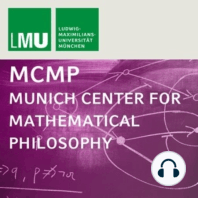67 min listen

Quantified Probability Logics: How Boolean Algebras Met Real-Closed Fields
Quantified Probability Logics: How Boolean Algebras Met Real-Closed Fields
ratings:
Length:
51 minutes
Released:
Feb 10, 2015
Format:
Podcast episode
Description
Stanislav O. Speranski (Sobolev Institute of Mathematics) gives a talk at the MCMP Colloquium (4 December, 2014) titled "Quantified probability logics: how Boolean algebras met real-closed fields". Abstract: This talk is devoted to one interesting probability logic with quantifiers over events — henceforth denoted by QPL. That is to say, the quantifiers in QPL are intended to range over all events of the probability space at hand. Here I will be concerned with fundamental questions about the expressive power and algorithmic content of QPL. Note that these two aspects are closely connected, and in fact there exists a trade-off between them: whenever a logic has a high computational complexity, we expect some natural higher-order properties to be definable in the corresponding language. For each class of spaces, we introduce its theory, viz. the set of probabilistic sentences true in every space from the class. Then the theory of the class of all spaces turns out to be of a huge complexity, being computably equivalent to the true second-order arithmetic of natural numbers. On the other hand, many important properties of probability spaces — like those of being finite, discrete and atomless — are definable by suitable formulas of our language. Further, for any class of atomless spaces, there exists an algorithm for deciding whether a given probabilistic formula belongs to its theory or not; moreover, this continues to hold even if we extend our formalism by adding quantifiers over reals. To sum up, the proposed logic and its variations, being attractive from the viewpoint of probability theory and having nice algebraic features, prove to be very useful for investigating connections between probability and logic. In the final part of the talk I will compare QPL with other probabilistic languages (including Halpern's first-order logics of probability and Keisler's model-theoretic logics with probability quantifiers), discuss analogies with research in Boolean algebras and show, in particular, how QPL can serve for classification of probability spaces.
Released:
Feb 10, 2015
Format:
Podcast episode
Titles in the series (22)
IF epistemic logic and mathematical knowledge: Workshop on Mathematics: Objectivity by Representation by MCMP – Philosophy of Mathematics